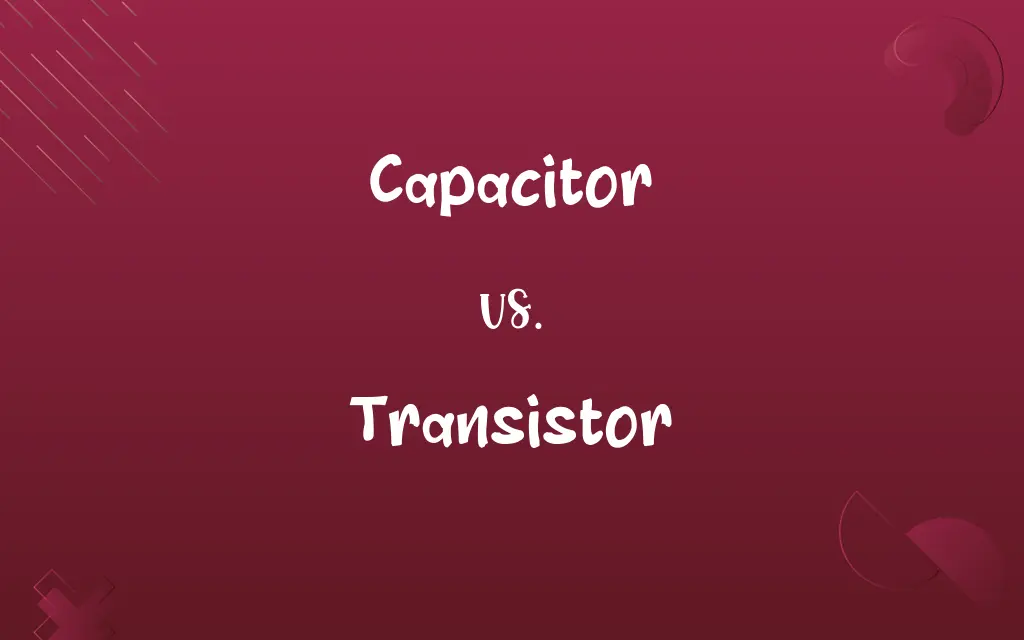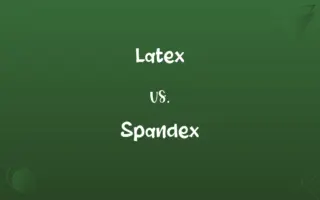Capacitor vs. Transistor: Know the Difference

By Shumaila Saeed || Updated on December 25, 2023
A capacitor stores electrical energy in an electric field, while a transistor amplifies or switches electronic signals and electrical power.

Key Differences
A capacitor is an electronic component that stores and releases electrical energy in the form of an electric field. It is typically used to hold a charge temporarily and release it when needed, acting as a small, temporary battery. Transistors, in contrast, function as switches or amplifiers in electronic circuits. They control the flow of electrical current and can amplify signals, making them fundamental in modern electronics for processing and controlling electronic signals.
Shumaila Saeed
Dec 06, 2023
the base, collector, and emitter. By applying voltage to the base, transistors control the current flowing between the collector and emitter, effectively acting as a switch or amplifier.
Shumaila Saeed
Dec 06, 2023
In terms of functionality, capacitors are primarily used for energy storage, power conditioning, signal coupling, and noise filtering in electronic circuits. They can smooth out electrical fluctuations and provide power surges when needed. Transistors, however, are used for switching electronic signals, amplifying currents, and in digital logic circuits. They are key components in microprocessors, amplifiers, and digital switches, underscoring their versatile role in electronics.
Shumaila Saeed
Dec 06, 2023
Capacitors can vary in size, shape, and capacity, depending on their intended use, from tiny ceramic capacitors in smartphones to large supercapacitors in power grids. The design and materials of a capacitor determine its specific characteristics, such as capacitance and voltage rating. Transistors, while also varying in size and specifications, are primarily classified based on their functionality, like bipolar junction transistors (BJTs) and field-effect transistors (FETs), each with distinct properties and applications.
Shumaila Saeed
Dec 06, 2023
Maintenance and longevity differ between the two. Capacitors can degrade over time, especially electrolytic types, which can dry out or leak, affecting performance. Transistors, on the other hand, are generally more robust but can be sensitive to high voltages, temperatures, and physical damage, which can affect their functionality. Both components are essential in modern electronics, each playing a distinct yet crucial role in controlling and manipulating electrical energy.
Shumaila Saeed
Dec 06, 2023
ADVERTISEMENT
Comparison Chart
Function
Stores and releases electrical energy.
Amplifies or switches electronic signals.
Shumaila Saeed
Dec 06, 2023
Construction
Two conductive plates separated by a dielectric.
Composed of semiconductor material with at least three terminals.
Shumaila Saeed
Dec 06, 2023
Primary Use
Energy storage, power conditioning, filtering.
Signal switching, amplification, digital logic.
Shumaila Saeed
Dec 06, 2023
Varieties
Different types based on size, shape, and capacity.
Classified by functionality, like BJTs and FETs.
Shumaila Saeed
Dec 06, 2023
Longevity and Maintenance
Can degrade over time, especially electrolytic types.
More robust but sensitive to high voltages and temperatures.
Shumaila Saeed
Dec 06, 2023
ADVERTISEMENT
Capacitor and Transistor Definitions
Capacitor
An electronic component that stores electrical energy.
The capacitor in the circuit provides a necessary power boost.
Shumaila Saeed
Dec 06, 2023
Transistor
Controls the flow of electrical current in a circuit.
By adjusting the transistor, we can control the current flow.
Shumaila Saeed
Dec 06, 2023
Capacitor
A device that holds an electric charge temporarily.
This capacitor stores charge for the device's memory retention.
Shumaila Saeed
Dec 06, 2023
Transistor
A semiconductor device used to amplify or switch electronic signals.
The transistor in this circuit acts as a fast switch.
Shumaila Saeed
Dec 06, 2023
Capacitor
Two conductive plates separated by an insulator.
The capacitor's plates are designed for maximum efficiency.
Shumaila Saeed
Dec 06, 2023
ADVERTISEMENT
Transistor
An electronic component with at least three terminals for connection.
Each transistor has a base, collector, and emitter terminal.
Shumaila Saeed
Dec 06, 2023
Capacitor
An electronic component that can smooth voltage spikes.
A capacitor is essential for stabilizing voltage fluctuations.
Shumaila Saeed
Dec 06, 2023
Transistor
A fundamental building block in digital and analog circuits.
Transistors are crucial in the design of microprocessors.
Shumaila Saeed
Dec 06, 2023
Capacitor
Used in electronic circuits for energy storage and filtering.
Capacitors in this audio circuit filter out unwanted noise.
Shumaila Saeed
Dec 06, 2023
Transistor
Used in various electronic devices for signal processing.
Transistors in this amplifier increase the signal strength.
Shumaila Saeed
Dec 06, 2023
Capacitor
An electric circuit element typically consisting of two metallic plates separated and insulated from each other by a dielectric, used to store charge temporarily or to filter signal frequencies. Also called condenser.
Shumaila Saeed
Oct 19, 2023
Transistor
A small electronic device containing a semiconductor and having at least three electrical contacts, used in a circuit as an amplifier, detector, or switch.
Shumaila Saeed
Oct 19, 2023
Capacitor
(electronics) An electronic component capable of storing electrical energy in an electric field; especially one consisting of two conductors separated by a dielectric.
Shumaila Saeed
Oct 19, 2023
Transistor
Any of various devices serving the same purpose but employing a different technology
An optical transistor.
Shumaila Saeed
Oct 19, 2023
Capacitor
A device used in electronic circuits to hold electrical charge, consisting of two conducting plates separated by a nonconducting (dielectric) medium; it is characterized by its capacitance.
Shumaila Saeed
Oct 19, 2023
Capacitor
An electrical device characterized by its capacity to store an electric charge
Shumaila Saeed
Oct 19, 2023
Transistor
(semiconductors) A solid-state semiconductor device, with three terminals, which can be used for amplification, switching, voltage stabilization, signal modulation, and many other functions.
Shumaila Saeed
Oct 19, 2023
Transistor
A component used in electronic devices consisting of three regions of at least two types of a semiconducting material, such as doped silicon, connected to each other and to three electrodes in a conducting path so as to modify the current or voltage in an electronic circuit.
Shumaila Saeed
Oct 19, 2023
Repeatedly Asked Queries
What is the unit of capacitance?
The unit of capacitance is the farad (F), named after Michael Faraday.
Shumaila Saeed
Dec 06, 2023
Can capacitors store energy indefinitely?
No, capacitors can discharge over time due to internal leakage and the properties of the dielectric material.
Shumaila Saeed
Dec 06, 2023
What is a capacitor?
A capacitor is an electronic component that stores electrical energy and releases it when needed.
Shumaila Saeed
Dec 06, 2023
What are the common uses of capacitors?
Capacitors are used in electronic circuits for filtering, timing, energy storage, and as coupling elements.
Shumaila Saeed
Dec 06, 2023
How does a capacitor work?
Capacitors store energy by storing electric charge on two conductive plates separated by an insulating material, known as a dielectric.
Shumaila Saeed
Dec 06, 2023
What is the purpose of the voltage rating on a capacitor?
The voltage rating indicates the maximum voltage a capacitor can handle without breaking down.
Shumaila Saeed
Dec 06, 2023
Do capacitors have polarity?
Some capacitors, like electrolytic capacitors, are polarized and must be connected with the correct polarity.
Shumaila Saeed
Dec 06, 2023
How does a transistor amplify signals?
A transistor amplifies signals by controlling the flow of current between its terminals based on a small input signal.
Shumaila Saeed
Dec 06, 2023
Are there different types of capacitors?
Yes, there are various types of capacitors, including electrolytic, ceramic, tantalum, and film capacitors.
Shumaila Saeed
Dec 06, 2023
What is a transistor?
A transistor is a semiconductor device used for amplifying or switching electronic signals.
Shumaila Saeed
Dec 06, 2023
What is the significance of the transistor's gain or amplification factor?
The gain factor indicates how much the transistor amplifies the input signal, and it varies between transistor types.
Shumaila Saeed
Dec 06, 2023
Can capacitors replace batteries in electronic devices?
Capacitors can store energy but typically have lower energy storage capacity than batteries, making them unsuitable for many battery applications.
Shumaila Saeed
Dec 06, 2023
Who is credited with the invention of the transistor?
The transistor was co-invented by John Bardeen, Walter Brattain, and William Shockley at Bell Laboratories in 1947.
Shumaila Saeed
Dec 06, 2023
What are the three primary types of transistors?
The three primary types of transistors are bipolar junction transistors (BJTs), field-effect transistors (FETs), and insulated gate bipolar transistors (IGBTs).
Shumaila Saeed
Dec 06, 2023
What is the difference between NPN and PNP transistors?
NPN and PNP transistors are different types of bipolar junction transistors with opposite current flow directions.
Shumaila Saeed
Dec 06, 2023
What is the gate in a field-effect transistor (FET)?
In FETs, the gate controls the flow of current between the source and drain terminals by varying the voltage applied to it.
Shumaila Saeed
Dec 06, 2023
How can you discharge a charged capacitor safely?
To discharge a capacitor safely, connect a resistor or short-circuit its terminals with a suitable tool.
Shumaila Saeed
Dec 06, 2023
What is the role of transistors in electronic circuits?
Transistors are essential components in electronic devices and circuits, including amplifiers, computers, and radios.
Shumaila Saeed
Dec 06, 2023
Can transistors be used as switches?
Yes, transistors can act as switches, turning electronic devices on or off based on the input signal.
Shumaila Saeed
Dec 06, 2023
Can transistors handle high power levels?
Transistor power-handling capabilities depend on their type and design, ranging from low-power signal transistors to high-power transistors used in power electronics.
Shumaila Saeed
Dec 06, 2023
Share this page
Link for your blog / website
HTML
Link to share via messenger
About Author
Written by
Shumaila SaeedShumaila Saeed, an expert content creator with 6 years of experience, specializes in distilling complex topics into easily digestible comparisons, shining a light on the nuances that both inform and educate readers with clarity and accuracy.








































































